喜欢爆粗口,骂过特朗普,这位CEO如何让一家正在衰退的企业实现华丽转身
|
今年2月一个傍晚,纽约时代广场纽约威斯汀酒店宴会厅中,一大群人正沉浸在暮色愉快的氛围中享受。这群人都是精英:由管理层评选出大概200位最佳员工。人群跟着节奏强烈的音乐兴奋点头(有Beck的“Wow”,由卡米拉·卡贝奥的“哈瓦那”,有些Young Thug,偶尔还有酷玩乐队的音乐)。有些人在玩竞技游戏,一边急切等待着拉动开关撒出五彩纸屑。 一般公司发布季报时不会这么夸张,但这是T-Mobile,之前一直业绩低迷的无线运营商,说起来,员工士气大振跟收入增加也确实有很大关系。 |
The crowd in the ballroom at the Westin New York at Times Square on this February afternoon is in a partying mood well before sundown. They’re enjoying the buzz of being an elite crew: some 200 employees handpicked by managers as top performers. They’re nodding their heads to a pounding soundtrack (Beck’s “Wow,” “Havana” by Camila Cabello and Young Thug, some Coldplay). They’re competing in cheering contests. And they’re antsy for the big moment when they’ll pull the triggers that set off a fusillade of confetti cannons. This is definitely not what most companies do on quarterly earnings day. But the company hosting this bash is T-Mobile the formerly downtrodden wireless carrier—where rebounding employee morale and rising revenue are almost inextricably linked. |
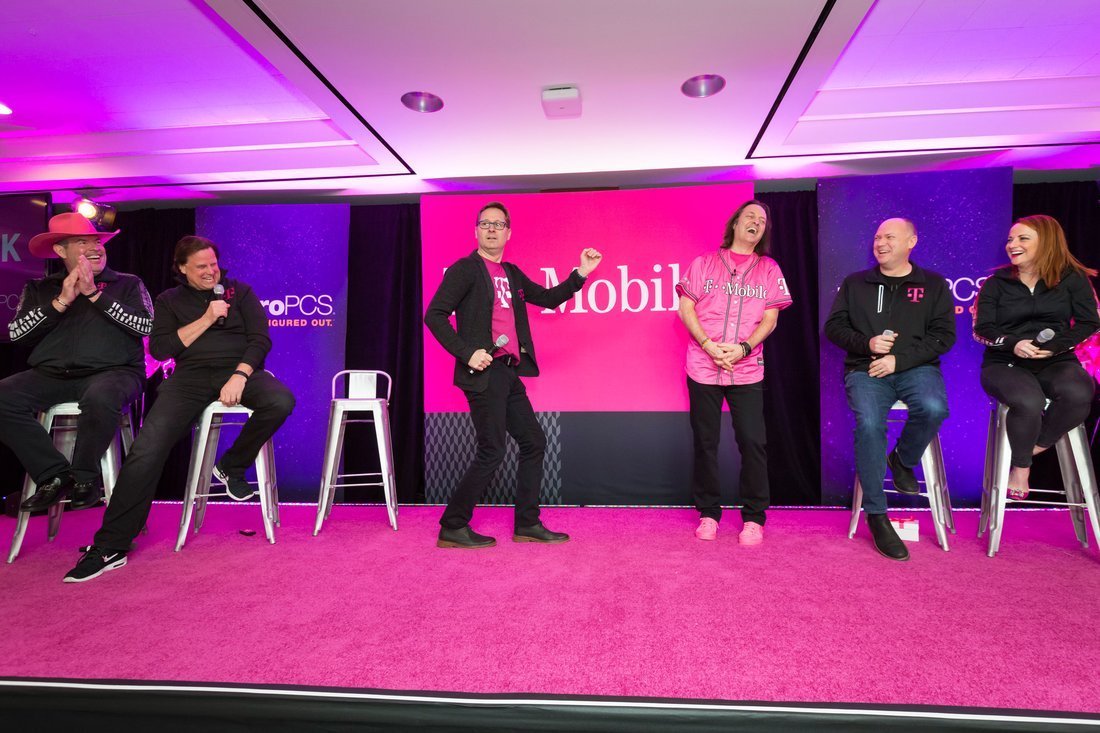
|
最后一次欢呼后,最大的明星出场了,他就是59岁的T-Mobile首席执行官约翰·莱格尔,一位工作起来不知疲倦,还经常喜欢爆粗口的家伙。他跟一群高管走进宴会厅,现场立刻热烈鼓掌。他也很快会意:“这么热闹?确实应该热闹下……今天我们宣布了非常亮眼的财务业绩,是我当首席执行官以来最好的一次。” 他说得没错。虽然过去一年里有些挫折,例如11月与竞争对手Sprint谈合并未果,但T-Mobile刚公布的财务数据非常令人振奋。2017年收入406亿美元,较2016年增加8%,较2012年的数字更是增加了一倍。2012年莱格尔正式就任首席执行官。与此同时,净利润达到创纪录的45.5亿美元。虽然用户人数仍远远落后于Verizon和AT&T,但今年第一次跻身《财富》最佳公司榜单的 T-Mobile显得动力十足。其发展重点一是无线领域,目前还在考虑收购机会;另一方面则是有线电视,正努力转向移动视频。 |
After one last cheer-off, the star of the show arrives. John Legere, T-Mobile’s tirelessly trash-talking, 59-year-old CEO, stalks in with a phalanx of senior execs, to the beat of a standing ovation. He quickly gets to the point: “Rowdy crowd? There’s a good reason to be rowdy … We announced results today that were just phenomenal, the best financial results since I’ve been CEO here.” It’s true: Despite a year marked by a major disappointment—merger talks with rival Sprint broke down in November, with no deal—the numbers T-Mobile has just announced are formidable. Its 2017 revenue was $40.6 billion, up 8% from 2016, and more than double its total in 2012, the year Legere took over; net income, meanwhile, reached a record $4.54 billion. While it remains far behind Verizon and AT&T in number of subscribers, T-Mobile, which makes its debut on the Fortune Best Companies list this year, has undeniable momentum. It’s intent on shaking up both the wireless world—it has its eye on other acquisitions—and the cable industry, with a tantalizing move into mobile video. |
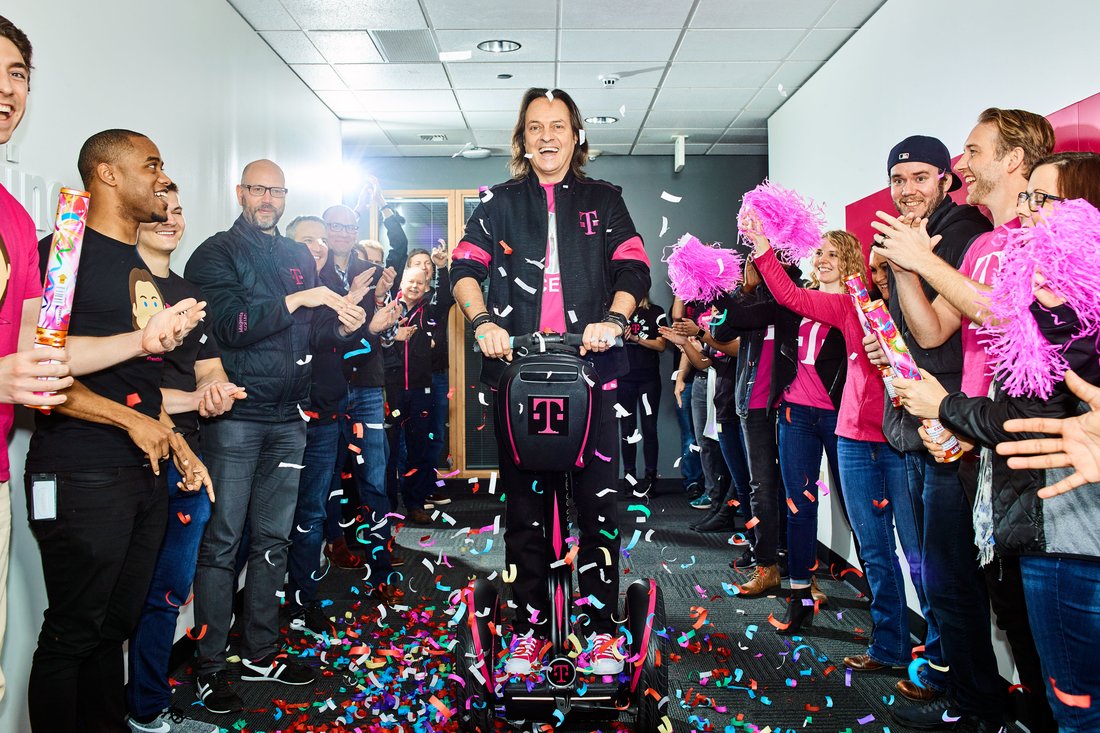
在位于华盛顿州贝尔维尤的T-Mobile总部,首席执行官约翰·莱格尔踩着赛格威平衡车参加员工活动。Photograph by Ian Allen for Fortune
|
知情人士和业界专家都表示,T-Mobile之所以业绩大振,正是因为此类聚会中呈现出的员工干劲。人群大声喊着“跟我们一起冲吗?”这是超级碗上T-Mobile公布以多元化为主题的口号。现场飘起了五彩纸屑。随后是提问时间,30分钟里,莱格尔和团队回答了宴会厅里和通过网络直播观看现场的观众们各种问题。莱格尔语速很快,语调平和,还向勇于发问的员工颁发现金奖励(手边有一卷20美元钞票)。有些是搞笑问题(我们有没有买五彩纸屑公司的股票?),但其他问题都很真诚,很有探索精神。之后数十位员工排起队跟首席执行官握手,摆好姿势拍合影。莱格尔又待了大概半小时,跟在场所有员工都握手拍照。 “他真是个了不起的人,跟我之前见过的首席执行官都不一样,”跟莱格尔自拍后,在纽约布朗克斯T-Moblie实体店工作的唐纳德·史密斯表示。“他看起来特别真诚。” 莱格尔显然更擅长引发争议。他出了名的急脾气且好斗,而且特别喜欢骂竞争对手(他常说AT&T和Verizon“一个蠢过一个”),经常公开爆粗口,偶尔也在社交网站Twitter上参与骂战,2015年还曾与当时的总统候选人唐纳德·特朗普对骂过,原因是特朗普批评混合武术明星尤达·鲁西。(大选后,莱格尔说过去的仇“既往不咎”,而且对更宽松的管制环境表示乐观。)然而,莱格尔的疯狂并未影响公司,在他带领下T-Mobile已成发展速度最快,业绩也最好的无线运营商。 2012年底,莱格尔就任首席执行官,当时正是业绩低迷之时。当时T-Mobile还是德国电信子公司,一边眼睁睁看用户流失,一边等待着AT&T收购,结果监管机构叫停了这笔390亿美元的交易。莱格尔迅速采取一系列精明的举措重整了业务。T-Mobile与苹果达成出售iPhone的协议,还购买更多频谱改善网络。2013年T-Mobile上市时,之后股票开始交易。(德国电信仍是大股东。) T-Mobile成功还有一个关键,就是寻找业内对手,莱格尔到处树敌就是掀起通信行业战争的重要一击。(以前竞争对手会分开回应;现在多数置之不理。)策略主要是:抛弃正常的计划和价格。完全跟随用户的欲望,消除体验中的痛点。具体来说是不超过两年的合约计划,取消漫游费用,账单底部没有难以理解的费用。最重要的是,2016年,T-Mobile最先取消月度数据限额和超额费用,一举领先竞争对手AT&T和Verizon,还逼着对手效仿。 从数字就能看出成绩:2013年收购MetroPCS后,T-Mobile用户比其他运营商增速都快,达到7300万人。由于上市也是协议一部分,其股价也随之上升,表现超过竞争对手。或许更重要的一点是,其用户特别忠诚:据Business Insider旗下 BI Intelligence新近一项调查,T-Mobile约有四分之一用户表示无论如何也不换运营商,相比之下,AT&T的死忠用户只占16%,Verizon有15%,而Sprint只有7%。 T-Mobile拼命壮大无线领域的同时,竞争对手们都在忙别的。AT&T在争夺视频用户,收购了卫星电视公司DirecTV,又签订协议收购时代华纳(虽然受到反垄断调查搁置)。Verizon努力削减成本,出售Fios网络大部分资产。Sprint则在巨额债务中挣扎,去年还削减了改善网络设备方面的支出。 相比之下,T-Mobile一直以用户为中心。为了共同努力,公司高层很注重与一线员工互动。“莱格尔花很多时间跟T-Mobile员工接触,一边鼓舞士气,一边倾听。”莱格尔领导期间长期关注T-Mobile的BTIG研究机构分析师沃尔特·皮西科表示。“公司里有两种人,一种是客服,一种是客服的客服,”负责销售链的执行副总裁乔恩·弗雷尔表示。“我就是客服的客服。” 1月难得不下雨的一天,在西雅图郊区贝尔维尤10层一角的办公室里洒满阳光,莱格尔又在调解纠纷。 办公室不算大,堆满了东西所以显得有些挤。他穿着NHRA赛车服,颜色是T-Mobile标志红;旁边摆着之前被称为“T-Mobile女郎”的卡莉·福克斯形象纸板;桌上有两个女儿的照片;还有为慢烹饪节目准备的烹饪书,节目在Facebook上出人意料地受欢迎。 眼下让人烦心的是,语音玩具Furby Chewbacca娃娃跟另一个语音玩具“Corporate Yes Man”娃娃你来我往聊个没完。每次Furby咯吱一下,Yes Man就要答一句(“哦对,我在这呢。”“完全同意你的说法”),然后Furby跟着接话,Yes Man又回答,说个没完。“经常这样。”莱格尔说着,一边想让娃娃们闭嘴,可惜没成功。 |
That success, insiders and industry experts agree, is fueled by rah-rah rallies like this one. The crowd chants “Are you with us?,” a slogan from the diversity-themed ad T-Mobile unveiled during the Super Bowl. The confetti cannons do indeed fire confetti. And then it’s question time: For 30 minutes, Legere and his team field inquiries from employees in the ballroom and others watching via webcast. Legere keeps the pace rapid and the tone solicitous, doling out cash rewards (peeled off a stash of rolled-up $20 bills) for those brave enough to query him. Some questions are jokey (Have we bought stock in confetti cannons?), but others are sincere and probing. Afterward, dozens of employees line up to shake hands with the CEO and pose with him for pictures. Legere hangs around for almost half an hour until the entire line gets through. “He’s like an amazing person, different from everyone I’ve ever seen as a CEO,” Donald Smith, who works in a T-Mobile store in the Bronx, says after snapping a selfie with Legere. “He seems like he actually cares.” Legere certainly cares about making a ruckus. Famously brash and competitive, he’s best known for castigating his competitors (he routinely dismisses AT&T and Verizon as “dumb and dumber”), uttering public profanities, and engaging in the occasional Twitter war—including with then-candidate Donald Trump, in 2015, in a spat over tweets in which Trump criticized mixed-martial-arts star Ronda Rousey. (After the election, Legere said he had “got way past” the feud and was optimistic about the impact of a less restrictive regulatory climate.) Still, there is method to Legere’s madness, and it has helped T-Mobile become the fastest-growing and best performing wireless company during his tenure. Legere came on as CEO at the end of 2012, a low point for the company. T-Mobile, then a subsidiary of Deutsche Telekom, was shedding customers as it waited to be acquired by AT&T—only to see regulators block the $39 billion deal. Legere quickly shored up the business with savvy moves. T-Mobile got a deal with Apple to sell the iPhone. It bought more spectrum rights to improve its network. And in 2013 it went public, so its stock could be used for dealmaking. (Deutsche Telekom remains the majority owner.) Just as key to T-Mobile’s success was its decision to make an enemy of its own industry, launching a messaging war in which Legere’s f-bomb-throwing was central to the assault. (Its opponents’ flacks used to respond with indignation; now they rarely take the bait.) The strategy: Get rid of typical plans and prices. Embrace customer desires and eliminate their pain points. That meant no more two-year contracts, no more roaming fees, no more incomprehensible charges at the bottom of every bill. Most significantly, T-Mobile was far ahead of AT&T and Verizon in 2016 in scrapping monthly data limits and the annoying overage charges they generated—forcing its bigger rivals to follow suit. The numbers show how well it all worked: Boosted by its 2013 acquisition of MetroPCS, T-Mobile’s subscriber base has grown faster than any other carrier’s, to 73 million. Since going public as part of that deal, its stock has soared, trouncing its rivals. Perhaps most important, its customers are loyal: According to a recent survey by Business Insider’s BI Intelligence, almost one-quarter of T-Mobile’s customers say they would never switch to a competitor for any reason, vs. 16% of AT&T’s customers, 15% at Verizon, and just 7% at Sprint. T-Mobile has grown in wireless at a time when rivals have seemed to be looking beyond it. AT&T has been pursuing video customers, by buying satellite service DirecTV and agreeing to acquire Time Warner (though that deal has been held up by antitrust cops). Verizon is trying to shed costs, selling off major parts of its Fios network. Sprint, meanwhile, is struggling under a massive debt load; it slashed spending on network improvements last year. In contrast, T-Mobile has stayed relentlessly phone-consumer-focused. And to make the effort pay off, top brass interact constantly with their frontline colleagues. “Legere spends a lot of time with the T-Mobile workforce, building morale and listening,” says Walt Piecyk, an analyst at BTIG Research who has followed T-Mobile throughout Legere’s tenure. “There are two types of people in this company: those who serve customers and those who serve those who serve customers,” adds Jon Freier, the executive vice president who oversees the company’s retail chain. “I’m in the second bucket.” On a rare rain-free day in January, as sunlight pours into his 10th-floor corner office in the Seattle suburb of Bellevue, Legere is playing peacemaker. His relatively small workspace is crammed and crowded. He’s got his NHRA auto-racing suit, in T-Mobile magenta; a cardboard cutout of Carly Foulkes, the ex-pitchwoman colloquially known as the “T-Mobile girl”; pictures of his two daughters; and cookbooks for his slow-cooking show, a surprise Facebook hit. The current distraction, however, is a battle between a voice-activated Furby Chewbacca doll that has gotten stuck in a feedback loop with another voice-activated toy, a “Corporate Yes Man” doll. Every squawk and squeak from the Furby sets off the Yes Man (“Oh, yeah, I’m behind you all the way,” “Couldn’t agree with you more completely”), which gets the Furby talking again, triggering Yes Man, and so on. “This is so typical,” says Legere, trying unsuccessfully to shut off the doll debate. |
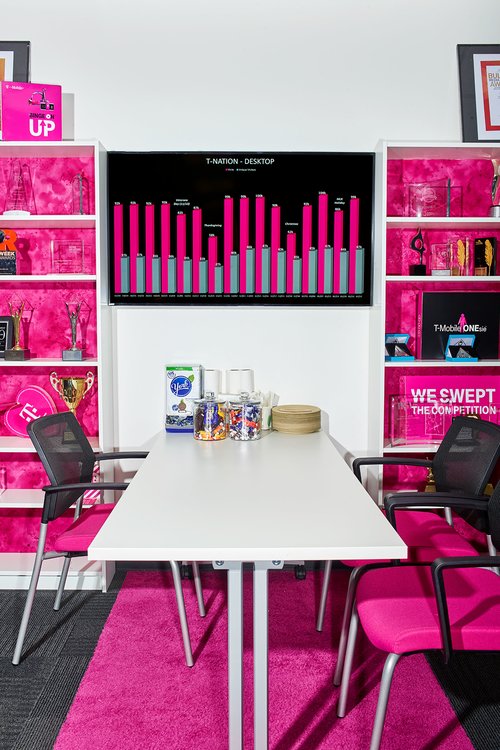
|
其实莱格尔并不总是骂骂咧咧。他曾在AT&T工作18年,做过各种管理职位,之后在电脑制造商戴尔负责亚洲和欧洲销售业务。“他总是能把握好分寸。”猎头公司罗盛咨询招聘主管雷·赛德尔表示,他认识莱格尔已经超过20年。“我觉得他变了很多。”莱格尔则表示现在很多工作方法学自戴尔公司创始人迈克尔·戴尔。他亲眼见到电脑大亨戴尔跟股东们打成一片,在公司年会上签名,他发现充满活力的首席执行官可以激发忠诚,也能获得大量免费宣传。“我学到了太多,”莱格尔表示。“他热爱客户,因为他喜欢自己的工作,喜欢与工作相关的一切。”戴尔对莱格尔也是赞誉有加。“约翰潜力巨大,前途无量。”戴尔在回复《财富》杂志的邮件中称。 莱格尔第一次担任首席执行官是在电信公司Global Crossing负责亚洲电信服务,之后升至母公司任职,但经历并不轻松。随着互联网和电信泡沫破裂,Global Crossing迅速申请破产,莱格尔裁掉数千员工。莱格尔任职期间,该公司亚洲部门还花钱和解两起性别歧视投诉,因为有女性员工指控莱格尔发表了歧视性言论,还在办公室有过激行为。(当时莱格尔未就和解发表评论;T-Mobile也拒绝就此事发表评论。)挽救公司的颓势花了多年,直到2011年莱格尔才终于扭转了销售局面。 在T-Mobile他几乎从头开始,这毕竟是飞速发展的行业里最大品牌之一,但在客户心目中形象不佳。他上任首席执行官后第一件事就是撰写宣言,开头是,“我们跟其他运营商不一样……我们是不用道歉的非传统运营商。”里面还写道,“我们要立刻给用户送达新手机,不能等。”刚上任不久,莱格尔就在办公室里装上客服热线,听服务人员跟用户对话,经常一听就是几个小时,而且听到很晚。大部分“非传统运营商”的想法,例如放弃签合同或取消费用等等都是因为听了用户跟员工对话。“之前我提出的整体策略,”他表示,“就是听员工的,听用户的,闭上臭嘴按照他们说的做。” T-Mobile确实贯彻了“照他们说的做”,还采取了“专家小组”策略,即授予呼叫中心的员工前所未有的权利。按照去年实施的该计划,T-Mobile将客户按照12万人分块,每一块由专门的小组负责,每个小组几十人,有专门的呼叫中心。用户打电话要求服务时,会转给指定的团队,而不是按照业内通常处理方式,随机分配给该时刻空闲的接待专员。因此用户发现,这里没有其他地方常见的转移呼叫推诿责任,实在让人厌烦。客服要为各自的用户群服务结果负责,业绩标准包括用户转投其他运营商的频次,或呼叫服务的频率,客服和管理者都有权发放服务积分和修改账单等。 |
Brashness wasn’t always typical for Legere. He built his career in various executive posts over 18 years at AT&T, and then at computer-maker Dell, where he ran sales in Asia and Europe. “He was always reasonably buttoned down,” says Rae Sedel, an executive recruiter at Russell Reynolds who has known him for more than 20 years. “I think he made a dramatic change.” Legere says some inspiration for his current approach came from his experience working for Michael Dell. He saw the PC mogul wading into crowds of shareholders and signing autographs at the company’s annual meeting, noting how a larger-than-life CEO could inspire loyalty and garner loads of free publicity. “I learned a ton,” says Legere. “He loved his customers, because he loved the subject matter and he loved everything about what they were doing.” Dell is happy to return the compliment. “You could see John had huge potential and a big future ahead,” the company founder says in an email to Fortune. Legere’s first CEO stints, at the Asian unit of telecom-services company Global Crossing and then at the parent company, were anything but fun. As the Internet and telecom bubbles burst, Global Crossing careened into bankruptcy, and Legere laid off thousands of employees. The company’s Asian unit also paid to settle two sexual discrimination complaints during Legere’s tenure, after female employees alleged that Legere made belittling remarks and behaved aggressively in the company’s offices. (Legere did not comment on the settlements at the time; T-Mobile declined to comment for this story.) Managing the company’s decline took years, and Legere stayed on until he engineered its sale in 2011. At T-Mobile he got to start over, at one of the biggest brands in a fast-growing industry—one with a major image problem among consumers. His first move as CEO was to draft a manifesto which began, “We’re not like the other carriers … we are unapologetically the un-carrier,” and included lines like, “We will give customers new phones right now instead of later.” Early on, Legere had a line installed in his office to listen in on customer service conversations, which he would do for hours, often late into the night. Most of his “un-carrier” ideas, like getting rid of contracts or dumping fees, came from listening to customers talk with staffers. “My entire strategy that I coined early on,” he says, “was listen to employees, listen to customers, shut the fuck up, and do what they tell you.” T-Mobile is doubling down on “do what they tell you” under an effort called “Team of Experts,” which has given call-center employees unprecedented authority. Under the plan, which launched last year, T-Mobile divided its customers into blocks of about 120,000, who are each assigned to a specific group of a few dozen employees at a specific call center. When customers call for support, they are routed to their assigned team, instead of being assigned to a random rep at the least busy center in the country, as is typical in the industry. There’s no transferring of calls elsewhere in a frustrating ducking of accountability. Reps are held responsible for the outcomes of their customer group, measured by metrics such as how frequently customers defect to another carrier or how often they call support, and reps and their managers are empowered to hand out service credits or alter bills. |
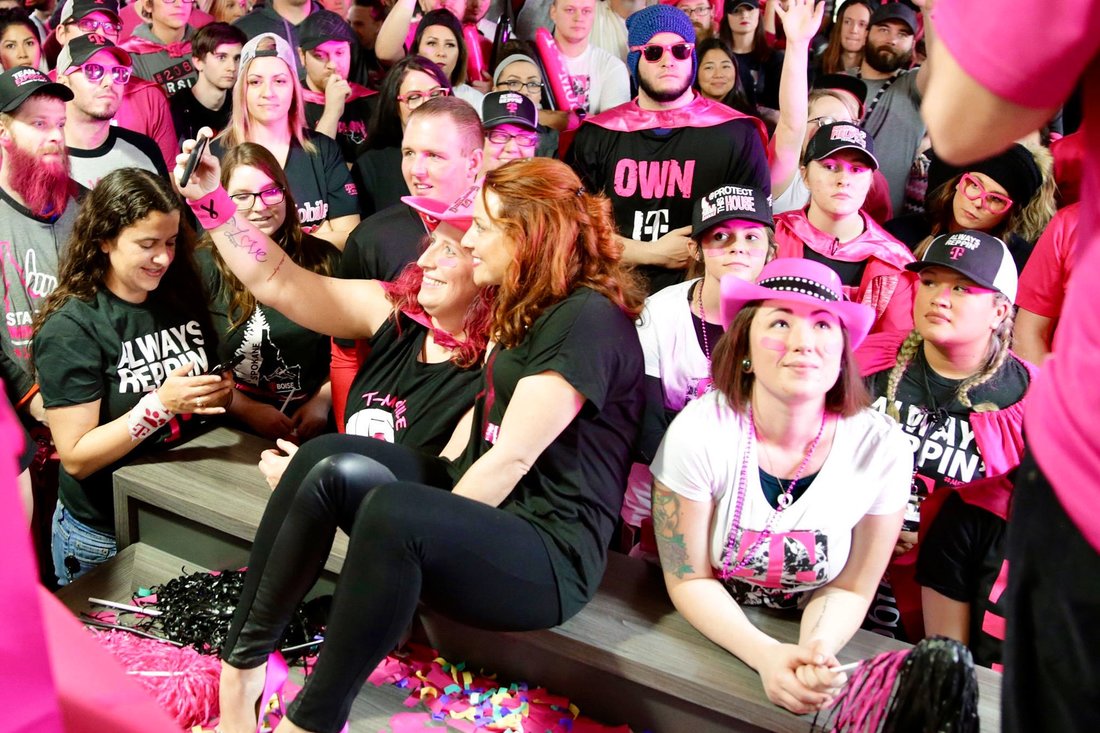
|
“行业人士都告诉我们说,不采用随机分配线路简直疯了。”T-Mobile负责客服业务的执行副总裁卡莉·菲尔德表示。但菲尔德介绍说,该措施实施以来T-Mobile的客服成本降低了9%,用户满意度提升了20个百分点。莱格尔表示,客服团队的新职责是提供更多数据,实现更精准的推广,还要提供用户对新方案的反馈。“这些人每天都要跟20位用户谈话,都是大金矿。” |
“People in the industry told us we were crazy to do non-randomized routing,” says Callie Field, T-Mobile’s executive vice president in charge of customer care. But T-Mobile’s cost to serve customers has dropped by 9% overall since it was implemented, while customer satisfaction scores increased by 20 percentage points, Field says. Legere says that the customer-care team’s new responsibilities give them even more data they can use to assess how promotions are going or whether customers understand new plans. “These people talk to 20 customers a day; that’s your gold mine.” |
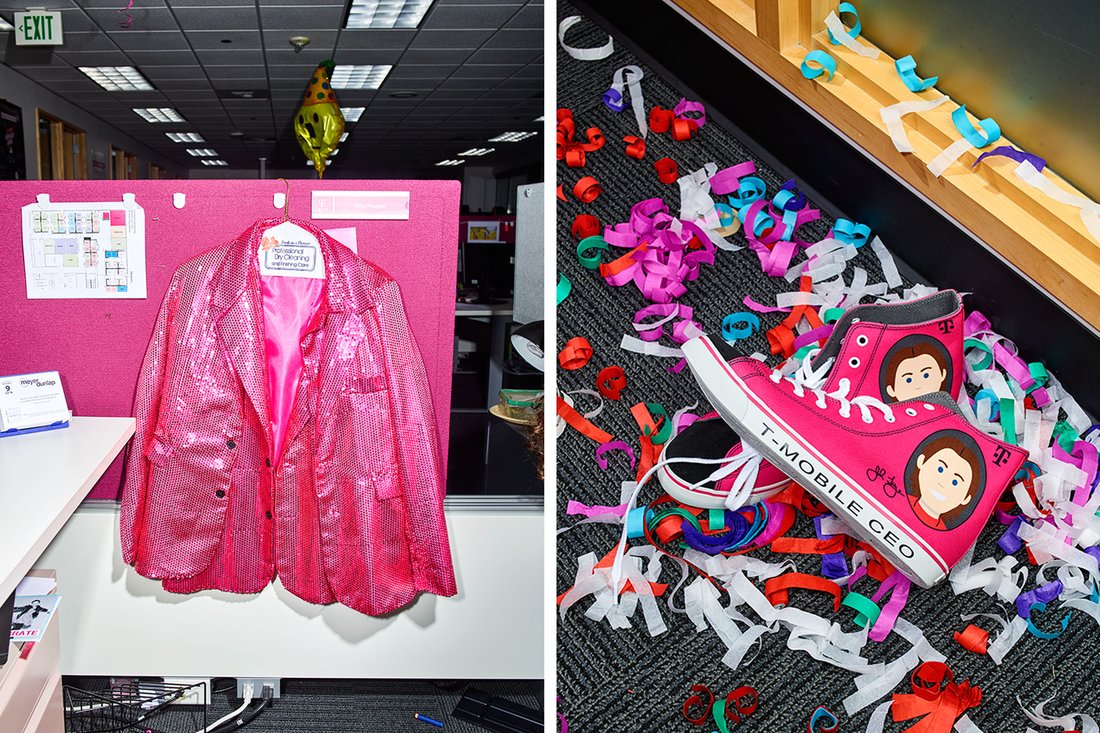
|
莱格尔喜欢去全国各地旅行,拜访各地“金矿”。他去实体店和呼叫中心,51000名美国员工里大部分工作的地方。2016年他突袭了全部17个呼叫中心,肯定不是去热门地点的愉快旅行,都是爱达荷的莫里迪恩、缅因州的奥克兰之类。(去年由于跟Sprint谈判棘手,他只去了两处,今年会弥补。)每次拜访,莱格尔都要办类似竞选拉票似的活动,宣传新产品和推广,或介绍财务业绩然后回答问题。每次他都会派发T-Mobile小礼品,签名,还跟员工拍自拍。 他还发钱,都是自己的钱。(T-Mobile最新发布的年度股东委托声明显示, 2016年莱格尔年薪2000万美元,之前一年是2400万美元。)最近他告诉莫里迪恩的员工,如果他们能在三个关键指标上超过其他呼叫中心,就自掏腰包40000美元开派对。后来莫里迪恩在两个指标上得了第一,第三个只拿了第二,但莱格尔还是兑现了诺言。今年1月他去呼叫中心前在当地银行现场取出40000美元小额钞票。 |
Legere likes nothing more than to travel around the country and visit that gold mine, at the stores and call centers where most of the company’s 51,000 U.S. employees work. In 2016 he hit all 17 call centers, and these weren’t pleasure trips to hot destinations—the centers are in places like Meridian, Idaho, and Oakland, Maine. (Last year, amid the knotty negotiations with Sprint, he got to only two, something he’s rectifying this year.) On each visit, Legere holds an almost campaign-like rally, talking up new products and promotions or recent financial results and taking questions. While he’s at it, he gives away T-Mobile gear, signs autographs, and poses for selfies. He’s also giving away money, his own money. (Legere made $20 million in 2016 and $24 million the year before, according to T-Mobile’s latest annual proxy filing.) He recently told workers in Meridian that if they beat all the other centers on three key performance metrics, he’d personally give them $40,000 to throw a party. When they ranked first on two and just barely came in second on the third, Legere made good anyway, stopping at a local bank branch to load up on $40,000 in small bills before visiting in January. |
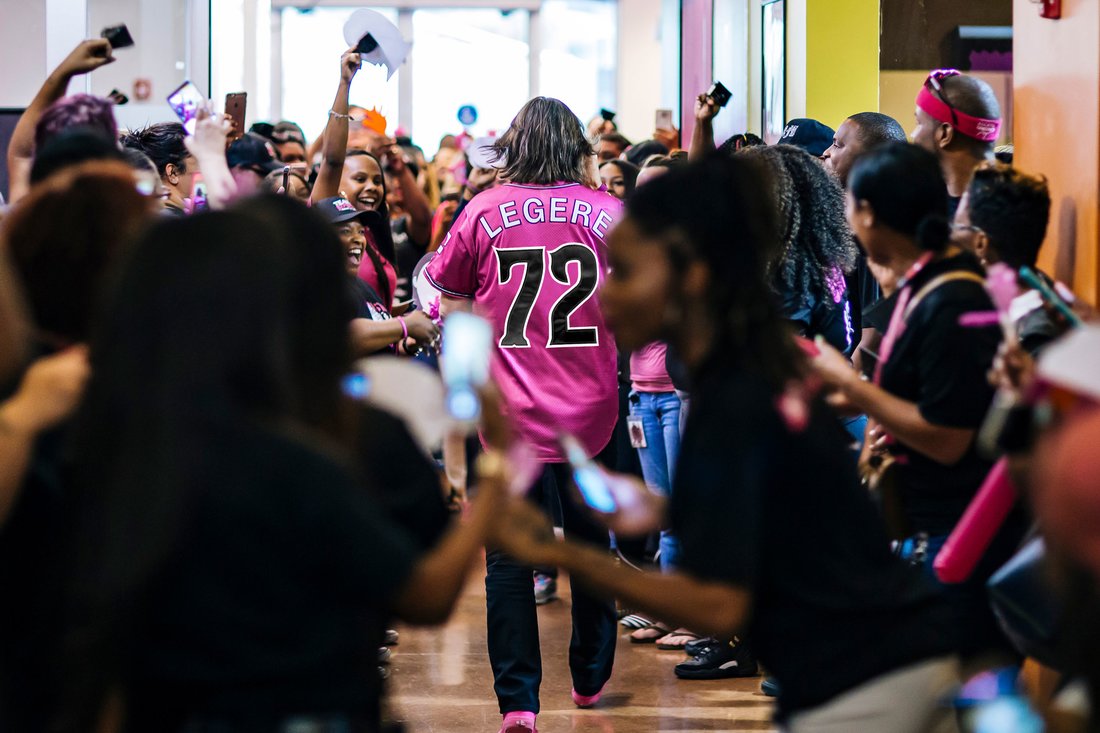
|
今年2月初在纳什维尔一次为零售店员工举办的活动上,莱格尔还玩了次意外出现。“他走进门,大家都以为是扮成史努比狗狗的演员。”在场的林德赛·卡特说,他在亚特兰大担任店长,最近刚升职负责地区销售工作。在问答环节,卡特向首席执行官提了个大问题。她问道,过去五年里你掌控了全行业,接下来五年会不会去竞选总统?“哦,不会的。”卡特说莱格尔立刻否认,还递给她一张百元钞票。 支持一线员工方面还不只包括免费活动。所有员工都可以享受助学金和带薪假期。虽然法律没有规定,T-Mobile已开始为同性恋伴侣提供配偶福利和保险,还推行禁止歧视规定,保护LGBTQ员工的权益。去年6月的纽约同性恋游行活动是全国规模最大的LGBTQ活动之一,T-Mobile是首席赞助商。“跟卖手机无关,” T-Mobile负责纽约游行活动的董事总经理克里斯·弗雷德里克表示。“我们想持续打造包容文化。” |
At an event in Nashville in early February for retail-store employees, Legere made a surprise appearance. “He walked in the door, and you would have thought it was Snoop Dogg,” says attendee Lindsay Carter, a store manager from Atlanta who was recently promoted to a regional sales job. In a Q&A session, Carter had a big question for the CEO. You completely dominated this industry in five years, she asked; in your next five years, are you going to run for President? “Uh, no,” Carter says he replied, as he handed her a $100 bill. Support for the frontline staff goes far beyond the freebies. All employees get tuition assistance and paid time off. T-Mobile started offering spousal benefits and insurance coverage for gay couples even when it wasn’t legally required to, and it enforces a nondiscrimination policy that protects LGBTQ employees. The company was the lead sponsor for last June’s NYC Pride, one of the largest LGBTQ events in the country. “It’s not about trying to sell phones,” says Chris Frederick, managing director at NYC Pride, of T-Mobile. “It’s creating an inclusive culture year-round.” |
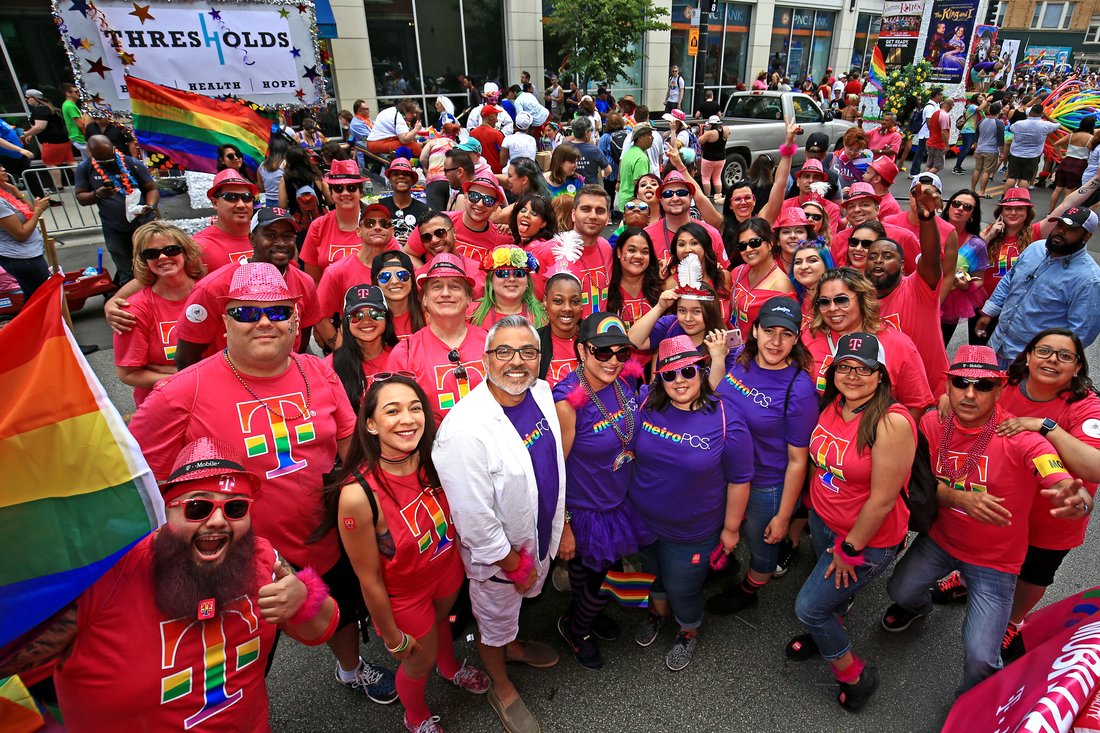
|
所有举措都促进了员工忠诚度。卡莉·菲尔德称T-Mobile呼叫中心每年人员流失率仅为23%,而行业平均水平是43%。伦敦商学院教授丹尼尔·卡波表示,大部分呼叫中心通过恐惧刺激员工,达不到目标就惩罚或强迫长时间通话。相反,T-Mobile的方法是“让员工感受到被尊重,重要的不只是业绩数字。”他表示。 不过,卡波提醒称,T-Mobile一些策略,例如莱格尔拜访都有“看起来像是‘一次性’活动的风险,影响不到员工日常工作。”另一方面,莱格尔发钱发纪念品看起来也带些富人傲慢的感觉。但莱格尔的粉丝称,他做得很成功,部分原因是莱格尔的出身跟蓝领粉领阶层的客服差不多。莱格尔在马萨诸塞州中部费奇堡一个工薪家庭长大,家中五个孩子,他排第三。高中是当地天主教中学,大学是公立学校马萨诸塞州大学。“他的成长经历并不光鲜,”企业猎头赛达尔表示。“全靠自己打拼。想获得别人的忠诚,首先得以诚待人。” 当然了,忠诚也伴随着责任。主管零售的乔恩·弗雷尔学习莱格尔回答员工问题的方法,给了个人手机号码,这样员工可以随时给他发短信提问题和建议。但每个店面员工都很清楚要时刻准备好,因为现在不像以前,用户所有反馈都能迅速直达领导层。“如果用户没享受到应有的服务愤然离店,很快就能传到约翰·莱格尔那里。”弗雷尔表示。“要么你服务好,要么让店长来,要么让地区经理服务,再不行让约翰·莱格尔亲自上阵。”(当然了,意思是,最好别闹到让约翰、乔恩知道。) 莱格尔迅速应答策略中,社交媒体的地位非常重要。莱格尔非常热衷发推文,甚至有些上瘾,他在Twitter上有超过500万粉丝。他总在嘲讽竞争对手。(最近他发了条文章链接,内容是发现尾巴上长刺的蜘蛛,评论是“还没有@verizon 的账单可怕呢。”)他也在全球最大声最公开的社交平台上处理投诉。如今T-Mobile安排了大概300人组成社交媒体团队(四年前只有23人),团队名称叫T-Force,专门处理让用户不爽的问题。虽然个性喜欢开玩笑,但莱格尔宣称在Twitter上的工作“非常严肃”。 去年11月跟Sprint谈崩之后,T-Mobile高层情绪有些消沉。如果达成协议,合并后的公司可以节省300亿美元成本。但Sprint大股东——日本的软银希望在合并后的公司保留相当的影响力,双方就Sprint股票估值相持不下。 最后一次去日本东京谈判之后两天,莱格尔在西雅图高级餐厅Canlis召集几位高层聚会,窗外就能看到喀斯喀特山脉。喝下几瓶酒后,他提醒高管们,谈判期间Sprint和T-Mobile的代号分别是西班牙和泰国,所以现在可以从两国中任选其一享受免费休假,也可以选择赛格威平衡车和黄蜂摩托车。(目前一位高管选了泰国,两位选了西班牙。“还没人选黄蜂摩托车。”莱格尔伤感地说。)调整心情后,高管们又开始准备下一个大计划。 下一步大计划若要成功,莱格尔旁边办公室里的高管们非常重要。首席技术官内维尔·雷的团队负责搭建维护T-Mobile的网络基础架构,团队成员非常多元,从电子工程双博士到地产专家再到现场技术人员都有。他表示,T-Mobile已经准备好收购美国一些独立的小型运营商,但没指出具体名字。整合新运营商可以加强技术团队实力,迅速吸纳MetroPCS网络就完成得非常漂亮。雷表示团队里是“一群非常热爱工作的疯子。” |
All the attention breeds loyalty. Callie Field says annual turnover at T-Mobile’s call centers is just 23%, compared with 43% for the industry overall. Most call centers motivate employees through fear, punishing them for not hitting targets or spending too long on the phone, says Daniel Cable, a professor at London Business School who has studied the industry. In contrast, T-Mobile’s approach of “making people feel valued and more than a number is important,” he says. Some of T-Mobile’s tactics, like Legere’s visits, run the risk of “seeming like a ‘one-off’ to employees without changing how the work itself makes them feel day-to-day,” Cable warns. And in other hands, Legere’s handouts of cash and gear could come across as plutocratic condescension. But Legere can carry it off, his fans say, in part because he identifies closely with the blue- and pink-collar customer service grunts. He grew up in the working-class city of Fitchburg, in central Massachusetts, the middle son of five kids. He attended a local Catholic high school and a big public college, the University of Massachusetts. “He didn’t grow up on the right side of the tracks,” says Sedel, the corporate recruiter. “He’s a self-made man. To get that kind of loyalty, you have to give in kind.” Of course, loyalty comes with accountability. Jon Freier, the head of retail, has copied Legere’s open Q&A format, giving out his own cell number so staffers can text him questions and concerns. But every store employee knows they have to be on their toes, because direct feedback from customers can reach the highest levels like never before. “If that person is walking out of the store not taken care of, John Legere is just a few keystrokes away,” Freier says. “You can take care of it, the store manager can take care of it, the district manager can take care of it, or John can take care of it.” (The implication, of course, is that you don’t want John, or Jon, to take care of it.) Social media is central to Legere’s strategy of radical responsiveness. An avid, almost addictive tweeter, Legere has over 5 million followers on Twitter. There he posts jibes at competitors at all hours. (“Still not as scary as a @verizon bill” he wrote recently, linking to an article about the discovery of spiders with stinging tails.) But he also fields complaints in one of the world’s most visible forums. T-Mobile now deploys a social media team of about 300 people (up from 23 four years ago) called the T-Force to address whatever issue is upsetting a customer. As jokey as his persona may be, Legere says, his Twitter work is “very serious business.” Back in November, after the Sprint deal failed, the mood among T-Mobile’s top ranks was downbeat. The deal could have generated cost savings of $30 billion for the combined company. But Sprint’s majority owner, Japan’s SoftBank, wanted to retain considerable control in the combined entity, and the two sides couldn’t agree how to value Sprint’s stock. Two days after his last negotiating trip to Tokyo, Legere gathered a half-dozen top lieutenants at Canlis, a high-end Seattle restaurant with commanding views of the Cascade Mountains. Over multiple bottles of wine, he reminded the execs that the code names for Sprint and T-Mobile during the talks had been “Spain” and “Thailand”—and offered to buy any of them either an all-expenses-paid vacation for two, to either country, or a pair of Segway scooters or Vespas. (So far one executive has chosen Thailand, and two picked Spain. “No takers on the Vespas yet,” Legere says wistfully.) With their attitudes adjusted, the execs went looking for their next big move. The success of that move may depend heavily on help from the executive in the office next to Legere’s. Chief technology officer Neville Ray oversees the team that builds and maintains T-Mobile’s network infrastructure, with a diverse staff that ranges from double-Ph.D.s in radio engineering to real estate experts to field technicians. Without naming names, Legere says T-Mobile is prepared to acquire some of the smaller U.S. carriers that are still independent. Integrating a new carrier would play to the strengths of the technical team, which won plaudits for its rapid assimilation of the MetroPCS network. Ray calls his crew “this bunch of crazies that really love this stuff.” |
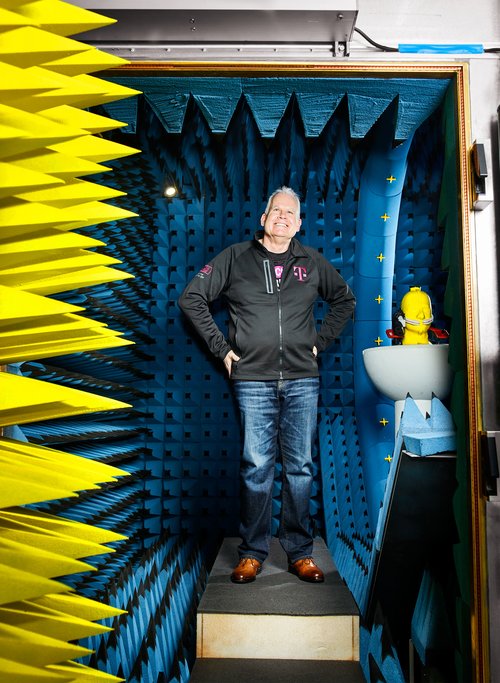
|
雷手下的工程师已经搭建好宽带网络,T-Mobile可以放心加入超高速5G无线网络服务竞争,2020年5G将成为行业标准。由此T-Mobile也有机会进入比无线行业更不受用户欢迎的行业:有线电视。12月,T-Mobile宣布斥资3.25亿美元收购总部位于丹佛的初创公司Layer 3,通过其内容协议和技术T-Mobile可以通过互联网提供有线电视内容和其他节目,能在客厅观看,也能在手机上观看。 之所以尝试视频领域,是因为无线行业增速逐渐放缓。2月宣布业绩时,虽然盈利创下纪录,但T-Mobile对新增用户的低预期还是让投资者吃惊。同时,大量视频消费已从电视转移至手机端(据研究公司eMarketer提供数据,现在超过70%的视频通过手机观看),所以莱格尔认为应该想办法打入付费电视领域,从年收入1000亿美元的行业中分一杯羹。 T-Mobile尚未介绍今后可能提供的服务,今年晚些时候会宣布。媒体观察人士指出T-Mobile加入了竞争非常激烈的领域,对手都是荷包满满的大佬,谷歌旗下YouTube TV、索尼的PlayStation Vue,还有AT&T的DirecTV Now。“视频市场走下坡路的当下,新来者能争得多少市场份额很让人怀疑。”长期观察电信领域的MoffettNathanson Research分析师克雷格·莫法特表示。 然而T-Mobile还是很难小觑。其无线业务产生的现金流充沛,加上莱格尔惯用不顾一切冲上去拼的推广策略,没准能杀出一条血路。“不用一上来就干掉康卡斯特,不过热爱电视又讨厌有线的用户终究会选择我们。”莱格尔谈及将来服务时表示。“毕竟,现在人人都离不开的是手机。”(财富中文网) 本文另一版本刊登于2018年3月1日出版的《财富》杂志。 译者:Pessy 审校:夏林 |
Ray’s engineers have also built bandwidth to enable T-Mobile to compete in ultrafast 5G wireless service, which is due to become the industry standard by 2020. That in turn could help the company take on an industry even less popular with consumers than the wireless industry was: cable TV. In December, T-¬Mobile announced the purchase, for $325 million, of Denver-based Layer 3, a startup whose content agreements and technology will enable T-Mobile to deliver cable channels and other programming over the Internet—to living rooms, or to subscribers’ phones. The foray into video comes as growth in wireless is slowing: On that February earnings day, even as it boasted record profits, T-Mobile startled investors with low forecasts for new-subscriber acquisition. Meanwhile, a huge amount of video consumption has shifted from TV to the mobile phone (over 70% of video is now viewed on mobile devices, according to research firm eMarketer), and Legere believes that puts some of the pay-TV industry’s $100 billion of annual revenue in play. T-Mobile hasn’t said much about its offering, which is due out later this year. Media watchers note that the company is diving into a crowded field, facing deep-pocketed rivals like Google’s YouTube TV, Sony’s PlayStation Vue, and AT&T’s DirecTV Now. “We are skeptical that yet another entrant in a declining video market can capture significant market share,” says longtime telecom analyst Craig Moffett of MoffettNathanson Research. Still, it’s hard to count T-Mobile out: The cash flow from its wireless business, paired with Legere’s knack for us-against-them marketing, could be a winner again. “It may not be the Comcast killer in the beginning, but it will be for people that love TV but hate cable,” Legere says of the offering. “Everyone gets their wake-up call.” A version of this article appears as part of the 100 Best Companies to Work For package in the March 1, 2018 issue of Fortune. |













